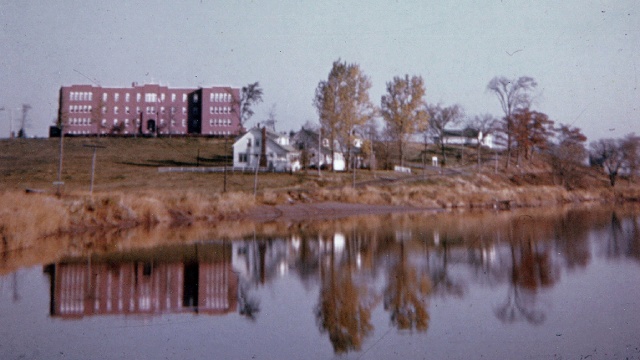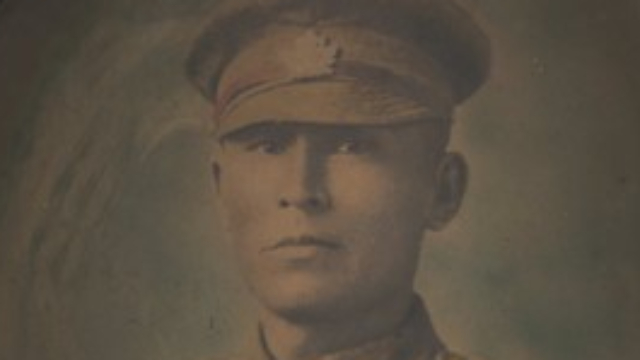
Historic designations related to First Nations, Inuit and Métis
Learn about the rich histories, heritage, resilience and diversity of First Nations, Inuit and Métis peoples. Parks Canada and the Historic Sites and Monuments Board of Canada (HSMBC) highlight a sample of national historic designations related to First Nations, Inuit and Métis peoples, places and events.
Do you know of a person, place, or event related to Indigenous History that should be recognized?
Submit a nomination
Featured national historic designations

Former Shubenacadie Indian Residential School National Historic Site
The former Shubenacadie Indian Residential School was built in 1928-29 in Nova Scotia. Many Mi’kmaq, Wolastoqiyik and other Indigenous children were forced to attend the only residential school in the Maritimes.
Location : Commemorative plaque: 47 Indian School Road, Shubenacadie, Nova Scotia

Francis Pegahmagabow National Historic Person (1889-1952)
Francis Pegahmagabow was a highly-effective sniper and scout in the First World War, and his military service and passionate advocacy for Indigenous rights continue to be an inspiration to his Nishnaabe community.

June is National Indigenous History Month
Every June, the Government of Canada honours the histories, achievements and resilience of First Nations, Inuit and Métis peoples, who have cared for this land since time immemorial.
National historic designations by themes
Remarkable persons

Charlotte Small Thompson (1785-1857)
Charlotte Small Thompson represented the many Indigenous women who formed significant partnerships with fur traders, bringing their knowledge of language, culture and survival skills to 18th and 19th century trade and exploration.

Chief Peguis (1774-1864)
A skilled hunter and diplomat, Chief Peguis worked to protect the rights and interests of the Anishinaabeg of Red River and stepped in to save lives when fur trade animosities threatened the Selkirk Settlement.
Kahgegagahbowh (George Copway) (1818–1869)
Kahgegagahbowhwas an early Anishinaabe author of popular non-fiction books, which expressed pride in his nation, engaged with Victorian and Romantic literatures to challenge their racism, and offered non-Indigenous readers—in Canada and abroad—important insights into Mississauga spirituality, history, and culture.

Marie Rose (Delorme) Smith (1861-1960)
Community builder, homesteader, rancher, and author, Marie Rose (Delorme) Smith exemplified the leadership of a Métis woman.

Nahnebahwequay (1824-1865)
In the mid-19th century, Nahnebahwequay was a Mississauga activist who fought against colonial policies that dispossessed First Nations from their lands.

Onondeyoh (Frederick Ogilvie Loft) (1861–1934)
Onondeyoh (Frederick Ogilvie Loft) was an important First Nations political leader in the period following the First World War.

Peter Pitseolak (1902-1973)
Aware that Inuit culture was undergoing momentous change, Peter Pitseolak took care to record both the old customs and beliefs of his people and their adjustment to a new life.

Thanadelthur (died 1717)
This young Dene woman, a skilled interpreter and negotiator, played a crucial role in the expansion of the English fur trade in the Northwest.

Théophile Panadis (1889–1966)
Théophile Panadis dedicated his life to safeguarding, sharing, and perpetuating Abenaki traditional knowledge and ways.

Thomas George “Tommy” Prince (1915–1977)
Tommy Prince was a prominent Anishinaabe activist and veteran whose brave and tragic life has long held popular resonance.

‘Wii Niisł Puuntk (Lucille Clifton) (1876-1962)
Former Laxsgiik (Eagle Clan) leader, she is an outstanding example of a centuries-old role held by prominent Gitga’at (Tsimshian) women in this matrilineal society.
Defining events

Abenaki Basket-Making Industry (1870-1920)
Between 1870 and 1920, the Abenaki basket-making industry flourished in Odanak and Wôlinak, two communities located on the south shore of the St. Lawrence River.

Aboriginal Military Service in the First World War
This was the first time the Canadian forces integrated a substantial number of Indigenous men into their ranks as individual soldiers.

Breaking Racial Barriers in the National Hockey League
In the early decades of the National Hockey League, men such as Paul Jacobs, Henry “Elmer” Maracle, Larry Kwong, Fred Sasakamoose, and Willie O’Ree broke through racial barriers at each stage of their careers, ultimately reaching hockey’s premier league.

Cunningham v. Tomey Homma
Prominent Japanese Canadian Tomekichi “Tomey” Homma fought a landmark legal battle in 1900–1903 against a provision of the British Columbia Provincial Elections Act, which barred Asian Canadians and First Nations from voting.

The Residential School System
Residential schools for Indigenous children existed in Canada from the 17th century until the late 1990s. During the 19th and 20th centuries, a formal system for the residential schooling of Indigenous children was established and expanded throughout Canada.

Meshikamau-shipu Travel Route
The Meshikamau-shipu Travel Route in Labrador brought Innu to familiar places of cultural significance such as gathering sites where Innu families from across Nitassinan, the Innu homeland, came together.
Significant sites

Áísínai'pi
Also known as Writing-on-Stone Provincial Park, this site is located on the Milk River in southern Alberta, 150 km east of the Rocky Mountains. Aísínai'pi, meaning "it is pictured, it is written", is one of the most important sacred places for the Niitsítapi (Blackfoot).

Fall Caribou Crossing
For centuries, the fall caribou crossing on the Kazan River was essential to the inland Inuit, providing them the necessities of daily life and the means to survive the long winter.

Former Muscowequan Indian Residential School
The large, three-storey former school building, built in 1930-31, is the only standing residential school in Saskatchewan. It has been saved from demolition by Muscowequan residential school survivors and community members who see it as an important witness to the history of residential schools.

Former Portage La Prairie Indian Residential School
Built in 1914-1915, the former Portage La Prairie Indian Residential School is located on Keeshkeemaquah Reserve, part of the reserve lands of Long Plain First Nation. The building has been given new meaning by the community as a site of commemoration and resilience that keeps the legacy of the residential school era alive and educates the public.

Former Shingwauk Indian Residential School
Located in Sault Ste. Marie, Ontario, on Robinson-Huron territory on the traditional homeland of the Anishinaabe and the Métis, the Shingwauk Indian Residential School was built in 1934-35. Since the closure of the school in 1970, the site has been a place of cultural reclamation and education.

Kiixin Village and Fortress
Kiix̣in was the traditional capital of the Huu-ay-aht, one of the Nuu-chah- nulth peoples. The village features standing First Nations architectural remains, rare in southern coastal British Columbia.

Mehtawtik (Meductic) Village
Mehtawtik (Meductic) Village overlooks the former location of Mehtawtik, principal village of the Wəlastəkokewiyik (Maliseets) on the banks of the Wəlastəkw (Saint John River), standing at the end of a portage that provided an important link to an inland waterway.

Skmaqn-Port-la-Joye-Fort Amherst
At this site, the Mi’kmaq met the French in the 18th century to renew their friendship and military alliance at a time when the French and British empires were fighting for supremacy in North America.

T'äw Tà'är
The history of this meeting place and village, also known as Winter Crossing, illustrates how the Ta’an Kwäch’än have lived on, valued, and shaped their land in cooperation with their neighbours.

Tr'ochëk
Tr'ochëk lies at the heart of Tr'ondëk Hwëch'in territory and is a gathering place that is valued for its rich natural resources and its significance to the community in sustaining and transmitting its heritage.

Tse'K'wa
Tse’k’wa is an exceptional archaeological site in northeastern British Columbia that has contributed to the understanding of environmental changes and human settlement from the end of the last glacial period (12,500 years ago) to 1,000 years ago.

No time to read?
Travel to the Pacific Northwest islands of Haida Gwaii, home to the Haida Nation for more than 13,000 years, and learn more about the rich history of Gwaii Haanas National Park Reserve, National Marine Conservation Area Reserve and Haida Heritage Site.
Search through over 3,600 designations listed in the Directory of Federal Heritage Designations (DFHD)
The Directory of Federal Heritage Designations offers a complete list of federal designations stemming from various programs. It includes information on districts, buildings, events, railway stations, lighthouses and people who are of historic value or interest.
Related links
- Date modified :
